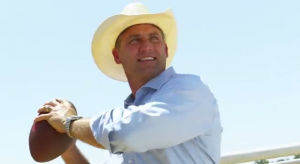CHRISTIANS ORDERED TO TEACH WICCAN, PAGAN RITES
Court to rule on government's decision to control religion classes
A dispute over whether government can require Catholic schools to teach Wiccan and pagan rites as equal to the Ten Commandments and the resurrection of Jesus is heading to Canada’s highest court.

“Faith-based educational institutions should be free to live and operate according to the faith they teach and espouse,” said Gerald Chipeur, Q.C., of the Canadian firm Miller Thompson LLP.
“If the government can force Loyola High School to violate its faith, then the government can do the same to others,” said Chipeur, a lawyer affiliated with the Alliance Defending Freedom.
The battle is over a government program adopted in Quebec in 2008 called “Ethics and Religious Culture” that is mandatory for all public and private schools. It presents all religions, from Christianity to Wiccan, “as equally valid” and requires schools to teach the beliefs in that fashion.
It also bans teachers, including those at private, denominational or church schools, from expressing their opinion that their own school’s faith is preferred.

The government order was challenged by Loyola High School, which is run by the Jesuits, a Roman Catholic order founded by St. Ignatius of Loyola. The school provides an education that is “publicly faithful to the authoritative teachings of the Catholic church.”
ADF filed a brief with the Supreme Court of Canada in support of the Catholic school after the court granted permission for other denominations to present arguments in the case.
The school had asked not to be exempted from the required teachings but to be allowed to make modifications in support of its religious faith.
“This school does not object to educating students about the diversity of faiths and what makes each faith distinctive, but the government should not require a Catholic school to tell its students that the Catholic faith is no more valid than a myriad of conflicting faith traditions,” said Alliance Defending Freedom Senior Counsel Brett Harvey. “All faith-based institutions must be free to speak and act consistently with their faith.”
The brief explains that the court itself previously has ruled that when a government action “had a religious motivation,” it must be “declared of no force or effect.”
“The motivation for the ministerial decision is clear and obvious. It is the same motivation that drives any jurisdiction to enact anti-blasphemy laws: the protection of religion. The protection of religion is a laudable objective, if done right. Unfortunately for Loyola, it was done wrong in this case and has led to limits on the religious speech of Loyola staff and students simply because the speech is religious,” says the argument.
“Unfortunately for Quebec, the ministerial decision places the government of Quebec with governments in Saudi Arabia, Egypt, Indonesia and Pakistan, where Catholics daily face limitations on what they can say for fear of being charged with the violation of anti-blasphemy laws.”
The brief explains that the government considered the “confessional nature” of the teachings proposed by Loyola and “thus deprived the ministerial decision of any validity.
“An unconstitutional purpose renders a government action of no force or effect, without the need for further analysis or inquiry.”
A previous court decision said the guarantee of freedom of conscience and religion “prevents the government from compelling individuals to perform or abstain from performing otherwise harmless acts because of the religious significance of those acts to others.”
“The most important consideration in this appeal is the nature of a religious school. That nature precludes teachers and administrators from abandoning their faith for one class or one hour during the school day, without fundamentally changing the character of the school,” the brief explains.
“In nations of the world where blasphemy laws are enforced, human rights rarely receive protection. Blasphemy laws are not the hallmark of a free and democratic society. However, there is no other way to describe the ministerial decision. The assessment upon which the ministerial decision was based insisted upon a program that did not include any opinion from teachers on the subject of religion. Blasphemy laws are characterized by their prohibition against religion opinions offensive to the government of the day.”
The case has significance beyond Canada, according to the Home School Legal Defense Association in the United States, because it would provide further legal basis for government to tell parents how to educate their children, even about faith matters.
HSLDA, which has a branch in Canada, asserted that a negative ruling by the nation’s highest court “would threaten the right of all parents to teach children in accordance with their religious beliefs.”
“The idea that parents – not governments – should decide how and what children are taught regarding values and religion is enshrined in fundamental notions of basic human freedom. Children are not the mere creatures of the state, and this idea has been uniformly held up as a vital human rights norm all over the world,” the organization said.
Paul Faris of the Home School Legal Defence Association of Canada said that if the lower court ruling stands, “it undermines the very foundations that protect homeschooling.”
“Whatever the court decides will apply to everyone right across the country. A loss could seriously restrict homeschooling freedom,” he said.
The Canadian Charter of Right and Freedoms, part of the Canadian Constitution, states that everyone has the fundamental freedoms of conscience and religion. However, the Québec legislature modified its own charter to let the government impose the curriculum on unsuspecting parents and educators.
Michael Donnelly, the director of international affairs for HSLDA, said the “trend in recent years to restrict homeschooling in Québec is extremely concerning, particularly [in] light of this case.”
“Freedom of religion in Canada is essential for homeschoolers in Canada. If this case is lost, the right to homeschool will be called into question for all of Canada,” he said.
Arguments are expected before the court soon, with a decision coming later this year.
WND has reported on instances in which the Canadian government ordered enforcement of a moral position or belief previously.
Education Minister Laurel Broten said on the issue of abortion: “The Catholic teachings are one aspect that we teach in our schools, but we do not allow and we’re very clear with the passage of Bill 13 that Catholic teachings cannot be taught in our schools that violate human rights and which bring a lack of acceptance to participation in schools.”
She noted the same law and standards apply to the issue of teaching homosexuality.
“Bill 13 has in it a clear indication of ensuring that our schools are safe, accepting places for all our students. That includes LGBTQ students. … Bill 13 is about tackling misogyny, taking away a woman’s right to choose could arguably be one of the most misogynistic actions that one could take.”
WND also reported government officials in Canada shut down a Christian ministry because it condemned cults and other influences that the Bible condemns.
What used to be called MacGregor Ministries essentially was ordered shut down under the nation’s “hate crimes” laws, which prevent Christians from expressing biblical opinions on a wide range of issues.
The organization moved to the U.S. to become MM Outreach Media Ministries.
Spokeswoman Lorri MacGregor said the ministry points out, with respect, the differences between Christianity and various cult beliefs. She said the work always is in response to a question or issue.
“When a group such as Jehovah’s Witnesses said of our doctrine we’re worshiping a freakish three-headed God (the Trinity), we should be able to respond,” she said. “We say, ‘Here’s the doctrine of the Trinity and here is where it is in the Scripture.’”
For that, the ministry was ordered to either make wholesale changes in its presentations or shut down.
“There was nothing we could do that would please them,” she said. “They wanted us every time we criticized something to say, ‘So Christianity is equal to Buddhism, Islam, Mormonism, Jehovah’s Witnesses. … Just decide for yourself.’”
“We cannot do that,” she said of the work she and her husband, Keith, have spent their lives developing.
The Colorado Springs-based Focus on the Family, one of the largest Christian publishing and broadcasting organizations in the nation, at that time confirmed it had been editing its broadcasts to avoid complications with Canadian “hate crimes” laws.
In a statement attributed to Gary Booker, director of global content creation for Focus, the organization said broadcast standards have a “dynamic nature.”
“Our staff at Focus on the Family Canada works proactively to stay abreast of the dynamic nature of broadcast standards, Canadian Revenue Agency legislation and both national and provincial human rights laws,” the statement said.
“Parameters regarding what can be said (and how it should be said) are communicated by Focus on the Family Canada to our content producers here at Focus on the Family in the U.S. To the best of our ability, programming is then produced with Canadian law in mind,” Focus continued.
“In particular, our content producers are careful not to make generalized statements nor comments that may be perceived as ascribing malicious intent to a ‘group’ of people and are always careful to treat even those who might disagree with us with respect. Our Focus on the Family content creators here in the U.S. are also careful to consult with Focus on the Family Canada whenever questions arise. Focus on the Family Canada, in turn, monitors the content produced in the U.S. and assesses this content against Canadian law,” the group said.




